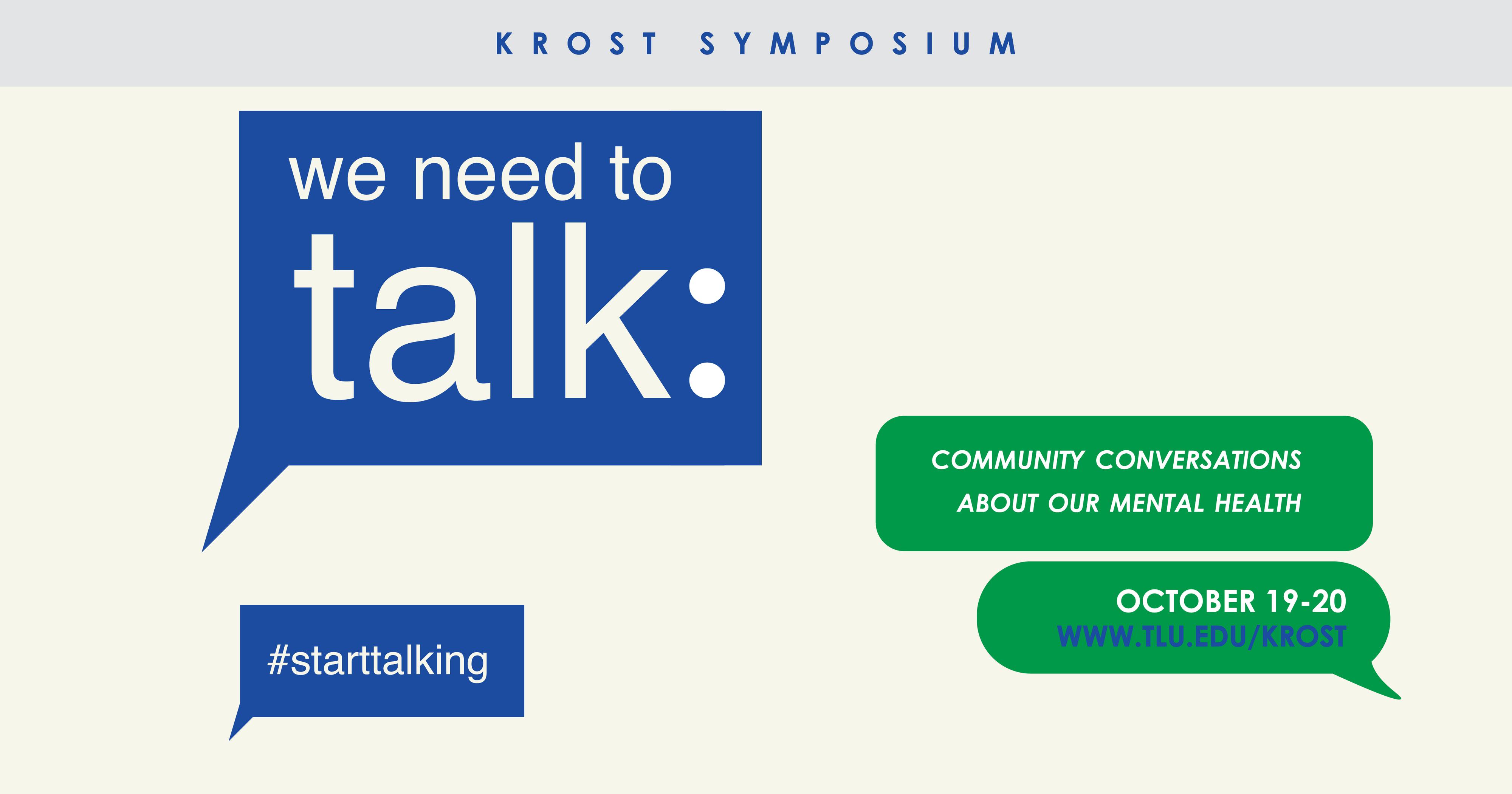More than half of Americans say COVID has had a negative impact on their mental health. In February 2021, the National Alliance
on Mental Illness (NAMI) found 43.4% of adults in Texas reported symptoms of anxiety or depression, and 26.4% were unable to get counseling or therapy. With discussions around urgency and access, the 2022 Krost Symposium asks the campus to have an honest dialogue about mental health, suicide prevention, and resources for college students.
“The truth is that we all face challenges to our mental health, we all need support from others, and we all need to provide support to others. We are not alone; we’re in this together.”
– Dr. Chris Bollinger, Krost Committee Chair
On October 19 and 20, “We Need to Talk: Community Conversations About Our Mental Health,” will examine issues impacting students, faculty, staff, and the people of Seguin. Krost Symposium Chair Dr. Chris Bollinger, professor of Communication Studies, says caring for our physical and mental health has always been difficult, but the pandemic has exponentially increased those challenges.

“A lot of folks have lost loved ones, many have experienced being and caring for those who are sick, and very few of us have escaped radical shifts in how we function in our daily lives, including school, work, and social engagements,” he said. “Many of us have struggled with isolation, depression, and anxiety, and some of us have experienced suicidal ideation. And the broader communal desire to get to our new normal and leave the pandemic behind has caused us to feel like we can’t even talk about how we are still struggling, leaving us feeling alone.”
Bollinger says guest speakers will cover a variety of topics, including one speaker who is internationally renowned for her work in suicide prevention, one focused on trauma-informed engagement and support, and alumni who will share the work they have been doing to enhance resilience, end stigma, and practice self-care in advocacy work. A main goal of the event is to explore how we can work together, overcome the stigma, increase conversations, and mobilize our community to engage in productive ways.
“As a culture, we have mistakenly long seen mental health challenges as a problem that some of us face and others need to fix,” he said. “The truth is that we all face challenges to our mental health, we all need support from others, and we all need to provide support to others. We are not alone; we’re in all this together. Stigma around mental health perpetuates the false notion that some people are deficient and encourages that we collectively view them as problems, ostracizing and isolating us as we experience challenge rather than collaboratively supporting each other and working together to meet these challenges.”
Unfortunately, Bollinger points out, as a society we have routinely elected to reduce access to programs supporting mental health needs so we can allocate financial resources elsewhere. Dr. Marlene Rendon, director of TLU’s Counseling and Accessibility Center, says lack of access to resources can disproportionately affect different groups, especially within communities that may have even more stigma around discussing mental health.
“We tend to think of mental health as a personal matter, something to be faced alone or with a therapist, rather than as a matter of public health,” she said. “Health care is already
a concern in the U.S. because of inequities in care, access, and affordability, and mental health is even more challenging. Mental health stigma is universal, but its pervasiveness is often higher in ethnic minority and religious communities.”
Rendon also says first-generation college students report higher levels of psychological distress compared to their later-generation counterparts, and are less likely to use readily available services on college campuses.
“Anxiety, depression, suicidal ideation, eating disorders, and substance misuse have been and continue to be the top mental health challenges for college students,” she said. “We need to incorporate mental health into health initiatives early and often to address the root of problems that increase the likelihood of mental health issues, including adverse childhood experiences, racial, LGBTQIA+ and economic inequities, societal pressure from social media and other systemic issues. While it’s important to address people currently needing help, we must start addressing the cause of these issues in a more proactive way.”
Krost Keynote Speaker: Dr. Sally Spencer-Thomas
Clinical psychologist. Advocate. Researcher. Suicide loss survivor.
October 19 at 7 p.m., Jackson Auditorium
View the full schedule at www.tlu.edu/krost.
